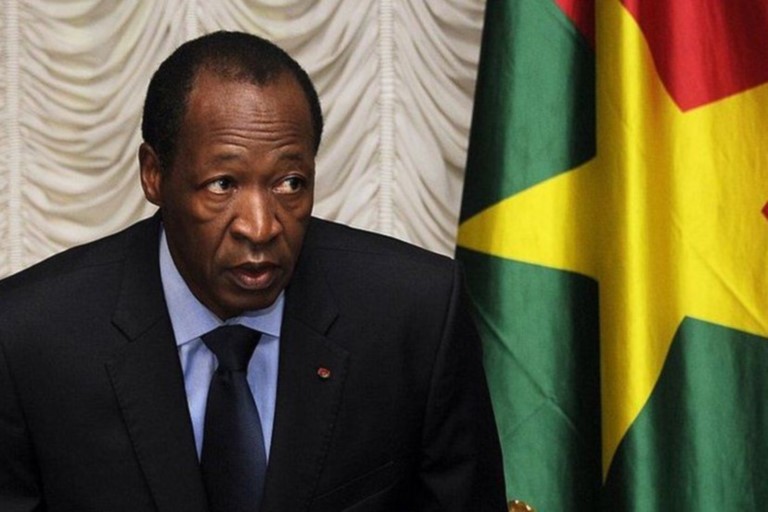Last week Wednesday, Burkina Faso’s former president, Blaise Compaoré and his former head of security, Hyacinthe Kafando, were sentenced in absentia to life in jail over their roles in the October 15, 1987 brutal murder of the country’s revolutionary folk hero and president, Thomas Sankara. General Gilbert Diendéré, one of the commanders of the army during the 1987 coup, and the main defendant present at the trial, was also handed life sentence. Eight other accused persons were given jail terms ranging from three to 20 years, while three defendants were acquitted.
The conviction and sentencing by a Special Military Tribunal after a six-month legal battle, brought the curtain down on a case that has tormented Burkina Faso for more than three decades. Ballistics experts told the trial that Sankara was shot in the chest at least seven times by tracer rounds with at least one bullet fired in his back. Campaore, who was found guilty of harming state security and complicity in the murder, had throughout his 27-year rule refused to discuss his predecessor’s death, fuelling speculations that he masterminded the assassination. It was not until after Campaore fled into exile during the 2014 popular uprising against his brutal dictatorship that Sankara’s remains were finally exhumed, triggering the process for the trial.
- COEASU backs ASUU on UTAS, asks FG to drop ego
- S/Court affirms 6-year jail, N22.9bn refund for ex-pension director, Yusuf
Dubbed the ‘African Che Guevara’, Sankara, known for his fiery speeches, was the iconic figure just 33 years old when he blazed to power in 1983, setting in motion a revolution that pledged to “decolonise African minds” and continues to inspire followers across the continent. But his experimental governance module came to a bloody end in October 1987 when he and 12 colleagues were gunned down by a hit squad during a meeting at the Presidential Palace in the capital, Ouagadougou. The massacre came with a corresponding coup that brought Sankara’s erstwhile partner and friend, Campaore, to power.
Compaoré, from his exile base in neighbouring Ivory Coast, denounced the proceedings as a “political trial.” But as the long-awaited verdict was read, applause erupted in the courtroom and reverberated around Africa. The trial was faithfully followed by many Burkinabes in a country formerly called “Haute-Volta” by the French, or “Upper Volta” in English, but which Sankara renamed as Burkina Faso – meaning, variously, “Land of the Honest”, “Land of the Upright”, or “Land of Incorruptible People”.
During the trial, the tensions between Sankara and his erstwhile ally Compaoré were detailed with several witnesses pointing to an “international conspiracy” to remove a troublesome leader who was not afraid to challenge the world order and rebuke France, the former colonial power. While Sankara’s revolution was silenced by the guns, his legacy of a progressive leader who took power to empower his people in a continent blighted by colonial plunder and mismanagement is not in doubt.
Ahead of his time, he recognized climate change and desertification as the greatest threat to his people, launching a massive tree-planting drive to “re-green” Burkina Faso, halt soil erosion and foster sustainable agriculture focused on preventing famine. It was a huge success, as records show that total local cereal production rose by 75% from 1983 to 1987. He launched nationwide literacy and public campaigns that saw thousands of Burkinabe adults and children enjoy the fruits of literacy and vaccinated over two million children. Moreover, he pursued the liberation of women, pointing out that women “carry the other half of the sky” – on top of the wood that fuels stoves and cookers and the water that feeds their families, their crops and their livestock. His foreign policies were anti-imperialist and Pan-Africanist. He rejected foreign aid and loans from the Bretton Woods institutions, the World Bank and the International Monetary Fund (IMF), even as he received same from other sources and sought to diversify and expand Burkina Faso’s domestic revenues.
The long-awaited verdict was a milestone for Burkina Faso and indeed Africa as it shows that justice delayed is not justice denied. It brings to the fore the fact that there is no escape from the long arms of the law. It tells African leaders that there is always a day of reckoning, no matter how long it takes. And it was a sweet victory too, coming 50 years after a foremost pan-African icon, Patrice Lumumba, Prime Minister of Democratic Republic of Congo, was brutally murdered by an international conspiracy that handed over power to the despot, Mobutu Sese Seko. Clearly, the killing of Sankara and Lumumba remains despicable criminal acts against Africa by enemies of the continent hiding under the Cold War politics. Perhaps, one day, justice will be served for Lumumba.
Sankara’s critics accused him of pursuing a policy of silencing dissenters, yet, it doesn’t blight his philosophy, thoughts and life which have become a compass, a shining light and hope for millions of Africans, especially his compatriots who had looked forward to a new Africa emerging from his guidance. Sankara’s dreams for his country may yet be realised.

 Join Daily Trust WhatsApp Community For Quick Access To News and Happenings Around You.
Join Daily Trust WhatsApp Community For Quick Access To News and Happenings Around You.


